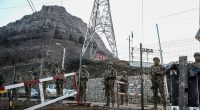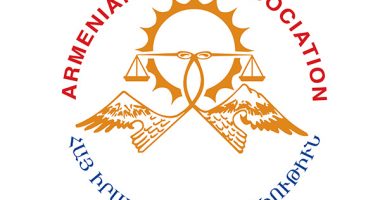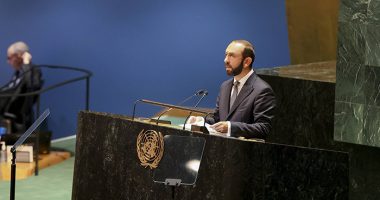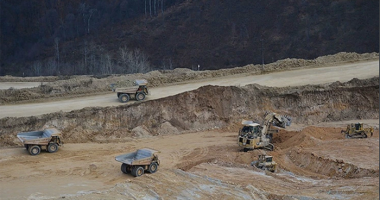WASHINGTON, D.C. — Last week, Congressman Adam Schiff (D-Calif.) sent a letter to President Biden urging him to act quickly and decisively to address the ongoing situation in Armenia and Artsakh as Azerbaijan continues to launch attacks and administer a blockade of the Lachin Corridor, creating a human rights crisis in the regio.
In the letter, Schiff expressed concern over the escalating threat of ethnic cleansing and genocide faced by the people of Artsakh and Armenia at the hands of the despotic Aliyev regime.
The letter also expresses concern that Artsakh has been used as a bargaining chip in the peace talks between Armenia and Azerbaijan, without any representation.
“The people of Armenia and Artsakh deserve a just and lasting peace. This will only be possible if the United States and the EU partners involved in talks remain committed to upholding democracy, human rights, the rule of law, and to respecting the legitimate rights of the people of Artsakh. We must take immediate measures to condemn ceasefire violations by Azerbaijan; call on Azerbaijan to immediately and unconditionally release all Armenian prisoners of war; hold Azerbaijan accountable for the ongoing blockade of the Lachin Corridor, including through sanctions and cutting off aid; and ensure the protection and right to self-determination of the people of Artsakh, whose people have spoken with one voice that they will not give up on their right to independence and a peaceful life with dignity” wrote Rep. Schiff.
Schiff has long been a vocal advocate for the United States to use all available means, including sanctions and restriction of aid, to stop Azerbaijan from using force, threats, and terror to expel and annihilate the citizens of Artsakh and take control of Artsakh or Armenian territory.
The full text of the letter can be found below and here.
President Biden,
In the South Caucasus we face a crisis of democracy, human rights, and the international rules-based order. After marking the 108th anniversary of the Armenian Genocide in April with pledges of “never again,” today the democratic and peaceful people of Artsakh face the real threat of ethnic cleansing and genocide at the hands of an autocratic Azerbaijani regime. Azerbaijani President Aliyev continues to use force, threats, and terror to expel or annihilate the citizens of Artsakh and take control of the Armenian territories, without consequences.
Not only has Azerbaijan tightened the chokehold around the people of Artsakh, but Azerbaijani forces continue to violate the territorial integrity of the Republic of Armenia by violating its sovereignty through an ongoing occupation that commenced in May 2021. Meanwhile, the United States’ positive statements on peace talks between Armenia and Azerbaijan are perplexing and appear detached from the reality on the ground. Ignoring Azerbaijan’s ongoing violations of the 2020 trilateral ceasefire statement and international law, and Aliyev’s increasingly hateful and threatening rhetoric toward Armenians, makes the United States complicit in the unfolding disaster. Your administration must take action to defend democracy and human rights before it is too late.
I am deeply concerned by the latest news that reveals Artsakh has been used as a bargaining chip in the peace talks, without any representation. This contravenes U.S. values and international law. Article I of the UN International Covenant on Civil and Political Rights states, “All peoples have the right of self-determination.” The Republic of Artsakh declared its independence with near-unanimous consent in a referendum on December 10, 1991, consistent with their rights under the Declaration on Principles of International Law concerning Friendly Relations and Cooperation among States (1970) in accordance with the UN Charter, following Azerbaijan’s deprivation of the fundamental rights of the region’s Armenian population and use of force. Unilaterally handing over the independent Republic of Artsakh to its oppressors will discredit the entire peace process, call into question U.S. commitment to international standards on self-determination and Responsibility to Protect, and create conditions for continued war and ethnic cleansing or genocide against the people of Artsakh.
The fragile security and humanitarian situation in Artsakh is deteriorating, with fresh reports of attacks by Azerbaijan in violation of the ceasefire statement almost daily and continued restrictions on freedom of movement along the Lachin Corridor. These actions reveal the genocidal intent to ethnically cleanse Armenians by forcible emigration from their historical homeland. For nearly six months now, Azerbaijan has blockaded the Lachin Corridor, the only road connecting Artsakh to the outside world. The effect has been devastating to the population, rendering 120,000 individuals without access to food, medical supplies and services, consistent gas and electricity, and essential human rights such as freedom of movement. Azerbaijan has ignored rulings from the European Court and the International Court of Justice, which ordered1 Azerbaijan to “take all measures at its disposal to ensure unimpeded movement of persons, vehicles and cargo along the Lachin Corridor in both directions.” Instead, Aliyev has taken provocative steps to further tighten the noose around Artsakh’s civilian population by unilaterally establishing an Azerbaijani checkpoint, under the watch of Russian peacekeepers who had assumed the responsibility to ensure the security and free movement of Armenians through the Lachin Corridor, which he openly brags about.
This is a clear violation of the 2020 trilateral ceasefire statement and has disrupted the delivery of even minimal lifesaving humanitarian aid and medicine. There are new reports2 that Artsakh will soon also face a water and energy crisis, as a key reservoir dries up and Azerbaijan refuses to allow the repair of electricity cables. Though the U.S. government, EU, and Russia have condemned the blockade and called for the corridor to be opened to regular traffic, Azerbaijan has ignored such statements for months. The time for statements has clearly long passed. The United States must immediately use other tools to press Azerbaijan to return to compliance with international law and order, by imposing sanctions and visa restrictions and cutting off assistance. If the United States remains committed to peace, this issue must be front and center in all communications regarding the situation in the South Caucasus region.
Against this backdrop, at a House Foreign Affairs Committee hearing on May 23,3 the USAID Assistant Administrator in the Bureau for Europe and Eurasia shared that Armenian Prime Minister Pashinyan had publicly “asserted Armenia’s recognition of Azerbaijan’s territorial integrity, which was an important first step that the team has put on the table. And this assertion is inclusive of Nagorno-Karabakh.” She said, “That is progress.” I find it shocking that a determination on the sensitive issue of the status of Artsakh, made without any input from the people of Artsakh or its elected leaders, would be considered a “first step” by the U.S. government, while Azerbaijan continues its blockade of the Lachin Corridor. No serious talks can take place while the innocent civilian population there continues to live in terror.
Officials of the democratically elected government of Artsakh, which has held free, fair, and transparent elections, continue to voice their desire to engage in peace talks with Azerbaijan, as an equal partner through an internationally recognized format, and in the presence of strong international guarantees for security, the right to self-determination, human rights, and the implementation of the parties’ obligations. The security and rights of the 120,000 Armenians living there cannot be guaranteed under the authoritarian rule of Ilham Aliyev, who orchestrated the ethnic cleansing of thousands of Armenians in Shushi and Hadrut during the 2020 conflict. Over the years, the atrocities committed by Azerbaijan against Armenians have been nothing short of deplorable, from the torture, mutilation and killing of Armenian civilians, soldiers and prisoners of war to the destruction of religious and cultural sites in Artsakh in an attempt to erase or falsify history. Armenians in Armenia, Artsakh, and the diaspora have memories of unspeakable horror, and of the murder of people they knew and loved. Furthermore, years of hateful, racist anti-Armenian propaganda have been woven into the very fabric of Azerbaijani society, which led to attacks and massacres on ethnic Armenians in Sumgait, Baku, and Kirovabad, and more recently the 44-day-war in 2020 and subsequent attacks, where Azerbaijani forces targeted and murdered innocent Armenians in Artsakh.
Instead of taking any steps to build confidence or show good faith in negotiations, Aliyev confirmed many people’s fears in his May 28 remarks4 in which he threatened the democratically elected leaders of Artsakh, stating, “Either they will bend their necks and come themselves or things will develop differently now…everyone knows perfectly well that we have all the opportunities to carry out any operation in that [Nagorno Karabakh] region today.” Furthermore, in a clear and blatant threat which cannot be enabled nor tolerated by the United States, Aliyev demanded Armenians of Artsakh to become “loyal and normal citizen[s] of Azerbaijan,” the resignation of Artsakh’s elected leadership, and the dissolution of Artsakh’s institutions (like the Parliament) which have been functioning democratically for 30 years.
It is clear from Aliyev’s May 28 statements that he feels justified and supported in continuing on his current course with the backing of the United States, Russia, and the international community. He stated, “international organizations have completely agreed with our position of late.” He then continued his threats against Armenia, stating, “Let them know that we can see Armenian villages from here. We can see those villages, so they shouldn’t forget about that.” Just two days later, the State Department issued an upbeat statement5 “welcom[ing] President Aliyev’s recent remarks on consideration of amnesty.” Notably absent is any condemnation of the ongoing blockade of the Lachin Corridor, of Azerbaijan’s transparent threats of military action, and aggression against Artsakh.
The people of Armenia and Artsakh deserve a just and lasting peace. This will only be possible if the United States and the EU partners involved in talks remain committed to values of democracy, human rights, rule of law, and respect the legitimate rights of the people of Artsakh. We must take immediate measures to condemn ceasefire violations by Azerbaijan; call on Azerbaijan to immediately and unconditionally release all Armenian prisoners of war; hold Azerbaijan accountable for the ongoing blockade of the Lachin Corridor, including through sanctions and cutting off aid to Azerbaijan; and ensure the protection and right to self-determination of the people of Artsakh, whose people have spoken with one voice that they will not give up on their right to independence and a peaceful life with dignity. We urge you to make clear to all parties – including Azerbaijani officials – that no final decisions on the status of Artsakh can be made without representatives of Artsakh at the table on equal footing. It is the right of the people of Artsakh to live free of political, cultural, and economic oppression, and as a protector of democracy, the United States must continue to support and stand with the people of Artsakh to achieve the recognition it deserves among all nations.
Thank you for your attention to this matter. I stand ready to work with the Administration in support of the people of Armenia and Artsakh.
Sincerely,
Adam B. Schiff
Member of Congress










